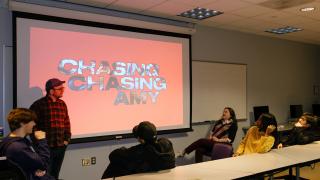
Alternatives to Violent Force is a seven-week workshop designed to help police officers think through different ways to handle confrontations.
Criminology and Criminal Justice Director Donald Shelton said the program can help officers begin to understand the need for balance with two distinct mentalities.
“We have turned our police officers into warriors—this idea that they are soldiers in a battle to preserve order,” said Shelton, a former longtime Washtenaw County Circuit Court judge. “But at the same time, they have to be guardians, treating civilians with respect and with safety. You have to be both, and that’s hard work.”
Shelton and Associate Professor Juliette Roddy launched the program last fall with 20 Dearborn police officers.
Officers meet on campus one night a week for seven weeks. Guest speakers discuss topics including public perception of the use of force, de-escalation, interacting with people from various backgrounds and cultures, and working with individuals with mental health issues.
Shelton and Roddy designed the curriculum after reviewing a study by the Police Executive Research Forum that developed 30 guiding principles for using force.
“The bottom line of all of their principles is recognizing the sanctity of human life, of all human lives,” Shelton said. “That is at the core of our discussions. We emphasize the sanctity of life and safety of not just our citizens, but of our police officers as well.”
Ronald Haddad, chief of the Dearborn Police Department (DPD), was among the first to express interest in the program. He says the use of violent force has decreased dramatically within the department in the last decade—from more than 200 incidents in 2008 to less than 10 last year—and DPD has been recognized nationally as a leader in community policing. But he believes continued training is paramount to maintaining trust within the community.
“We are grateful for the opportunity to have been partners in the pilot program and are committed to the program’s long-term sustainability,” Haddad said, noting that approximately 40 Dearborn police officers have participated in the program’s first two sessions. “A greater understanding of and sensitivity to the community is key to keeping everyone safe.”
The Alternatives to Violent Force program is the first course offered in the university’s Current Policing Curriculum Series in support of continuing education for members of the public safety community. Twenty-two officers—including officers from Dearborn and Ferndale—are participating in the second session, and a third session is scheduled to launch in March.
In December, the university received a $40,000 grant from the Community Foundation for Southeast Michigan to support additional Alternatives to Violent Force session for the Dearborn Police Department.
“The university has to be actively involved in the important issues in our society,” Shelton said. “One of the most important issues today is criminal justice and how our practice and perceptions of criminal justice are at the forefront of many of our societal issues. We want to involve the university in reform of the justice system to address these issues—and this program can help us make an immediate change.”





